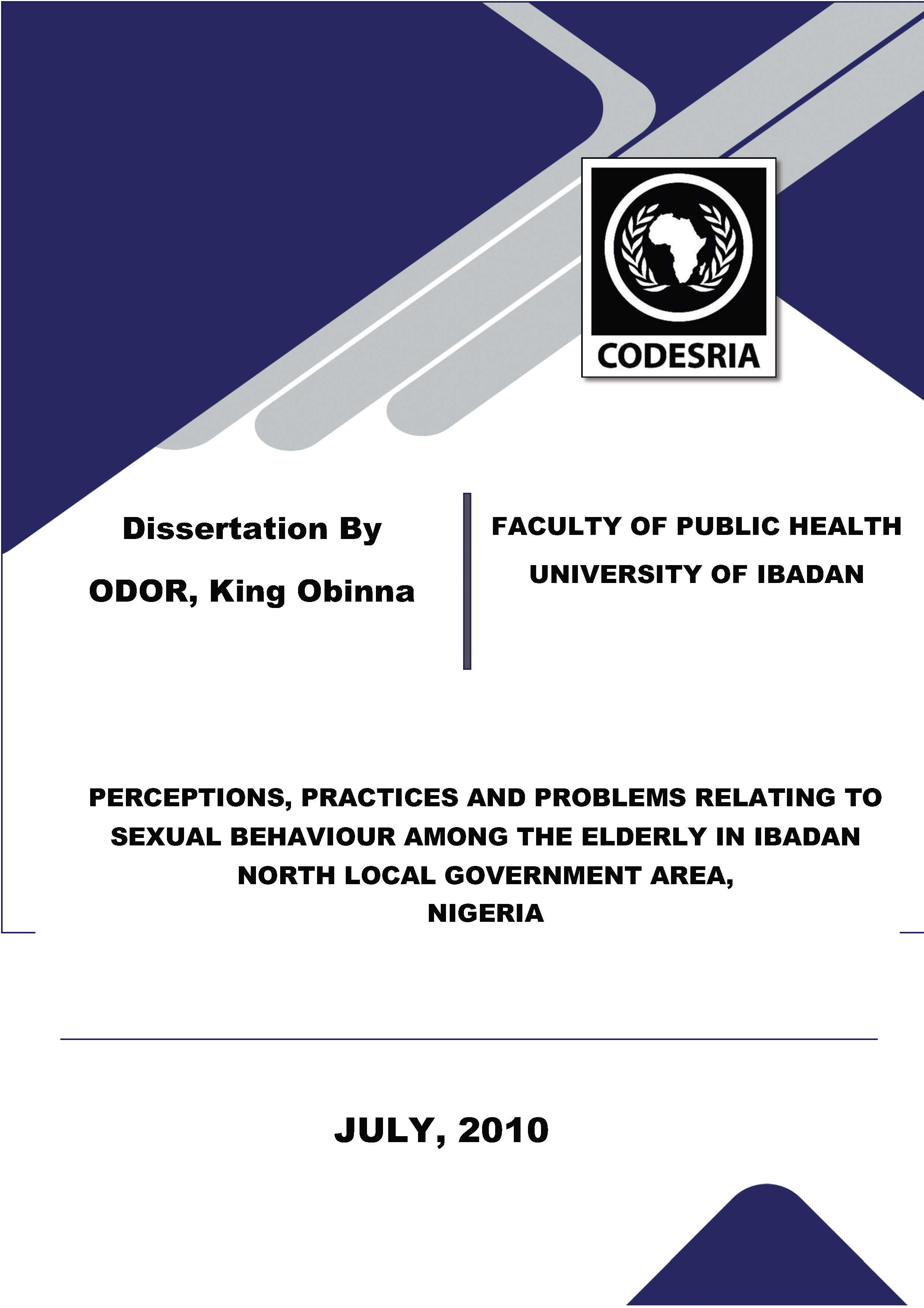PERCEPTIONS, PRACTICES AND PROBLEMS RELATING TO SEXUAL BEHAVIOUR AMONG THE ELDERLY IN IBADAN NORTH LOCAL GOVERNMENT AREA, NIGERIA
Mots-clés :
sexual behaviour, aged, condoms, reproductive health, Population, pratique, sexual practice, sexual dysfunction, NigeriaSynopsis
Most studies on sexual behaviour in Nigeria have focused on young people and adults with limited attention paid to the elderly. There is dearth of information about elderly persons’ reproductive health challenges, including sexual dysfunction, and their involvement in risky sexual activities. This study therefore determined the perceptions, sexual practices and reproductive health problems of the elderly in Ibadan North Local Government Area, Oyo State, Nigeria.
The study, which was descriptive and cross sectional in design consisted of 400 male and female elderly persons aged 65 years and above who were selected using a four-stage sampling technique. A validated questionnaire, which was designed from findings obtained from six Focus Group Discussions (FGD) - three each for male and female participants, was used to obtain information from the participants. The FGDs were recorded on audio-tape, transcribed and themes were developed. The data from the questionnaires were analysed using descriptive and Chi-square statistics.
The participants’ mean age was 71.8 (± 6.7) years. Slightly more than half, (50.5%) of them were males. A majority were Yoruba (91.3%) and Christians (63%). A total of 76.2% males and 12.6% females had their last sexual intercourse in the two years preceding the study. A total of 25% of the participants had had sex with persons other than their spouses since they attained the age of 65 years. Among this subgroup that had extra-marital sex, very few (6.8%) used a condom. More males (5.3%) than females (1.5%) had used a condom during their last episode of extra-marital sex (p<0.05). The low level of condom use was attributed to the belief that condom is not necessary (34.5%) and the perception (50%) that condom is not meant for the elderly. Death of spouse (78.5%) and loneliness (80.8%) were the main reasons for engaging in extra-marital sexual relationship. Majority (68.8%) of the participants were of the view that having sex with a virgin could serve as an immunity against sexually transmitted infections including Human Immunodeficiency Virus; those who held this view comprised 65.1% males and 34.9% females. More than half of the males (56.4%) and females (66.7%) agreed that indulgence in sexual intercourse has a healing effect on the elderly. Approximately 31.3% of the males reported early ejaculation and erectile dysfunction as the major sexual problems, while inadequate vaginal lubrication (10.3%) and menopausal changes (26.5%) were the main sexual problems reported by the females. Majority of the FGD participants across both sexes said that having difficulties in reaching orgasm and painful sex were other sexual and reproductive health problems of the elderly.
Téléchargements
Références
Adekunle, A.O. and Ladipo, A.O. (1992). Reproductive Tract Infections: Global impact and Priorities for women’s Reproductive Health. Homes. K.K; Piot. P; Wasserheit, Plenum Press. New York pp.297-316
Ajuwon, A.J. (1990). Socio-cultural practices that may favour the transmission of AIDS in a rural Yoruba community. Implications for Health Education; M.P.H. Dissertation. Unpublished. Department of Preventive and Social Medicine, University of Ibadan.
Ajuwon, A.J., Oladepo, O., Adeniyi, J.D. and Brieger, W.R. (1994). Sexual Practices that may favour the transmission of HIV in a rural community in Nigeria. International Quarterly of Community Health Education. 14 – pp 403-416
Ajuwon, A.J. and Shokunbi, W. (1997). Women and risk of HIV infection in Nigeria: Implication for control programs. International Quarterly of Community Health Education. 16(20)107-120.
Ajzen, I. and Fishbein, M. (1980). Understanding attitudes and predicting social behaviour.
Eaglewood Cliffs N.J. Patience Hall.
Akinrinola, B., Fatima, H.A., Neema, S., Ouedrogo, C. and Konyani, S. (2007). Knowledge of correct condom use and consistency of use among adolescents in four countries in Sub-Saharan Africa. Afr J Reprod Health 2007; 11(3):197-220
Akinsola, H. A. (2005). Research Methods in medical and nursing Practice. Ibadan: College Press and Publishers Ltd.
Alfredo N., Dale B. G., Sae C. K., Ken, M. and Edward, O. L., (2005). Sexual behaviour and dysfunction and help-seeking patterns in adults aged 40-80 years in the urban population of Asian countries. BJU International Vol. 95(4):609-612
American Psychiatric Association (1994). Diagnostic and Statistical Manual of Mental Disorders (4th edn) (DSM–IV). Washington, DC: APA.
Amuyunzu, N.M., Biddlecom, A.E., Ouedraogo, C. and Woog, V. (2005). Views of Sexual and Reproductive Health in Sub-Saharan Africa, 2005; Occassional Report No.16
Araoye, O.O. (2003). Research Methodology with Statistics for Health and Social Sciences. Ilorin: Nathadex Publishers
Asiimwe D., Kibombo, R. and Neema, S. (2003). Focus Group Discussions on social cultural factors on HIV/AIDS in Uganda. Kampala: Makerele Institute of Social Research.
Azuzu, M.C. (1994). Sexual beliefs, attitudes and knowledge of adolescent Youth in Ibadan concerning AIDS; West African Journal of Medicine. Vol.13 (4):245-247.






